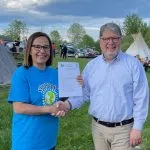
Journalist turned health and wellness advocate
Michelle Brass left journalism to help Indigenous communities build healthy relationships with food.
“I was interviewing somebody in the studio at CBC and I just remember that they were out in the world doing these really amazing things,” she said. “I was sitting in a dark studio day-in and day-out, interviewing people all over the world doing fun, awesome stuff. I thought ‘I’m gonna be on the other side of the microphone, doing fun and amazing things and getting interviewed about it.’”
Originally from Yellow Quill First Nation, Brass was living on Peepeekisis Cree Nation when she first started to make healthy changes in her own life.
“I [started] eating a lot more of our ancestral foods,” she said. “Lots of wild meat, berry picking and medicine picking. I walked a path of ceremony,”
“It’s not simply about food and nutrients, it’s about so much more,” explained Brass. “Our food has spirit. When we go to the land and collect that food, we’re connecting with spirit … it does change how we feel on so many levels. We’re sharing in the food, it strengthens community connection.”
A healthy lifestyle is something Brass is actively working to pass down to her 10-year-old son.
“(Children) learn by example, not by being told what to do,” said Brass. “(My son) has come out berry picking, medicine gathering … We’ve watched his dad, he goes hunting and fishing. (My son) understands these land-based food practices.”
She said her journalistic curiosity led her to research the benefits of land-based food practices.
“I’m always very curious as to how we got to where we are today,” said Brass. “How did we find ourselves in this position where we’re suffering such negative health impacts in our communities? Chronic disease, diabetes, obesity. How is this tied to the food that we eat?”
Brass studied nutrition online through the New York City based Institute for Integrative Nutrition. She also trained as a life coach through the Martha Beck life coach training program.
Brass developed the Sustainable Health and Wellness Leader (SHAWL) program to help individuals and First Nation communities with their wellness journeys. When it comes to problems like food sovereignty and the impacts of climate change on food systems, it’s important for the solutions to come from within the affected community.
Canada’s systemic genocide and historical displacement of First Nations people has left survivors with the task of re-establishing healthy food practices.
Brass wants to help set communities on the right path using knowledge from the people.
“Our knowledge and wisdom comes from the people,” said Brass. “From the memory of our parents, and grandparents and great grandparents and the knowledge of the land, and the land will tell us what will best work for that community. Every ecosystem is different.”
Kimberly Greyeyes-Pinay lives on Muskeg Lake Cree Nation where Brass visited to discuss sustainability. “Sustainability to me means the person as a whole,” said Greyeyes-Pinay. “Your food, your spirituality.”
The community already follows land-based food practices in many ways, including having a greenhouse and a food forest. Greyeyes-Pinay says that 80 per cent of the meat her family eats is wild.
“Sovereignty is about making decisions for your community,” said Brass. “It does need to be sovereign processes. It cannot be somebody from outside coming in and telling somebody what to do. I mean, that’s just never the way to go about it in an effective way.”
To Greyeyes-Pinay, food sovereignty is about “looking to our future, not only for our children but for our grandchildren.”
Brass can be found at her professional website, www.michellebrass.com.

